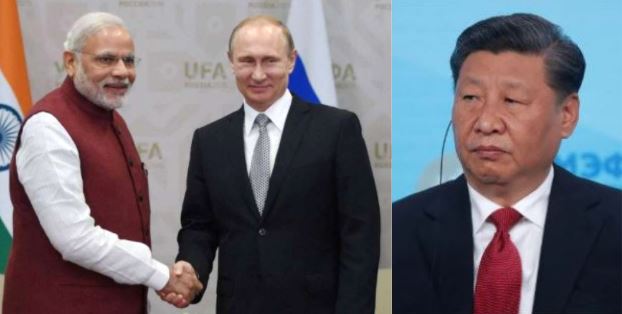Russia and China are having a major fall out, and India is the one getting to marginalise China with Moscow getting more and more aligned with Indian interests. We at TFI have written a series of editorials over the past four months exposing the cracks in the Sino-Russian “strategic axis of convenience” namely hegemony in Central Asia, Arctic tussles and Chinese claims over Vladivostok (Russian Far East), while the mainstream media keeps clubbing Moscow and Beijing together.
Now, China itself has started feeling the heat over the prospect of Russia joining the league of India and the United States to settle scores with China. And yet new issues are also cropping up- delivery of Russian defence equipment to India and suspension of the S-400 missiles delivery to China, which are making Beijing feel that Moscow has chosen New Delhi.
While several bilateral issues mar the Sino-Russian relationship, Russia and China have really failed to avoid their own insecurities from going public ever since the Galwan Valley bloodbath between the Indian Army and the Chinese People’s Liberation Army (PLA).
As per a latest SCMP report, the jingoist Chinese elements went up in arms after Russia boosted arms sales to India following the violent face-off in Galwan Valley. To many CCP trolls within China, the increase in Russian arms sales to India seemed like a stab in the back. One Chinese internet user, for example, wrote, “While fighting your opponent, how would you feel if your friend handed over a knife to your opponent?”
But Russia doesn’t give two hoots about China’s concerns. Dmitry Stefanovich, a research fellow with the Centre for International Security at the Russian Academy of Sciences’ Institute of World Economy and International Relations, pointed out that Moscow has been supplying arms to India even before the ongoing Eastern Ladakh stand-off.
Just like we at TFI had pointed it out, Russia doesn’t want to stop exporting arms to India. Stefanovich said, “The Russian defence industry, obviously, would like to remain in the Indian market, which is getting more and more competitive, with France and the US being the most obvious challengers.”
Another major issue that can be described as an aftermath of Russia’s decision to choose India over China is the Vladivostok dispute. Beijing’s wolf-warriors started staking claim on the Russian city last month.
Ultra-nationalist Chinese elements are aggravating the Vladivostok tussle. Hu Xijin, the editor-in chief of Global Times, a CCP mouthpiece that serves as an extended arm of the Chinese Foreign Ministry, refused to refer to Vladivostok as “tongzhi dongfang” or “Ruler of the East”, which is the meaning of its Russian name and chose to call it by the Chinese pseudonym- Haishenwei.
But the biggest shock for China has come from the Indo-Pacific. Indian Ambassador to Russia, D. B. Venkatesh Varma recently persuaded Moscow to be more involved in the Indo-Pacific. India reportedly sought a quid pro quo with Russia with New Delhi supporting Moscow’s Greater Eurasia strategy and Moscow supporting New Delhi’s Indo-Pacific Initiative that aims to contain Chinese influence in the region.
The Chinese strategic circles are outraged with India’s attempt to lure Moscow into the Indo-Pacific. Some Chinese commentators have even called it a “betrayal of China” as explosive as inviting Moscow to join the North Atlantic Treaty Organisation (NATO). But with right incentives India can achieve this ‘explosive’ ambition.
In fact, the foundation for bringing Russia into the Indo-Pacific was already laid last year when India signed a pact with Moscow for the development of the Chennai-Vladivostok sea route. The sea route connects the Russian Far East with India and it passes through the South China Sea, almost the whole of which is claimed by China.
And now, India has come up with the proposal of a trilateral mechanism involving New Delhi, Moscow and Tokyo that would officially witness Moscow pursuing its own interests in the Indo-Pacific.
As we at TFI predicted it, India is thus bringing the past Cold War adversaries Moscow and Washington closer to a strategic rapprochement. Bringing Russia into the Indo-Pacific becomes a fertile ground for a strategic understanding between Russia and the US to fight a common enemy, that is, China.
When asked about Washington’s opinion on embracing Russia to counter China, Mike Pompeo said, “I do think there’s that opportunity.” If we may add, it is India which is offering that opportunity.
And this is rattling China. India has pushed Moscow to pick a side and Putin has unsurprisingly chosen PM Modi over the CCP General-Secretary Xi Jinping. Beijing suddenly realises that Russia is no friend. In fact, Russia wants to settle scores with China, though an isolated China has no choice but to somehow keep the shallow “strategic axis of convenience” with Russia alive.
